Accounting Research Project: ASX Listed Companies Analysis
VerifiedAdded on 2022/08/20
|11
|3272
|11
Report
AI Summary
This accounting research project investigates the adoption of sustainability reporting and social accounting by ASX-listed companies. The research employs a qualitative research design, utilizing secondary data collected from annual and sustainability reports of ten selected ASX-listed companies. The methodology includes content analysis for data analysis and simple random sampling. The report addresses ethical considerations, research limitations, and regulatory, sustainability, and ethical issues, such as lack of accounting education and incomplete disclosure. It identifies key theories like agency theory, signaling theory, legitimacy theory, and stakeholder theory. The literature review explores corporate social responsibility and its importance in business. The project aims to provide a comprehensive analysis of sustainability reporting practices, offering valuable insights into the challenges and opportunities for ASX-listed companies.
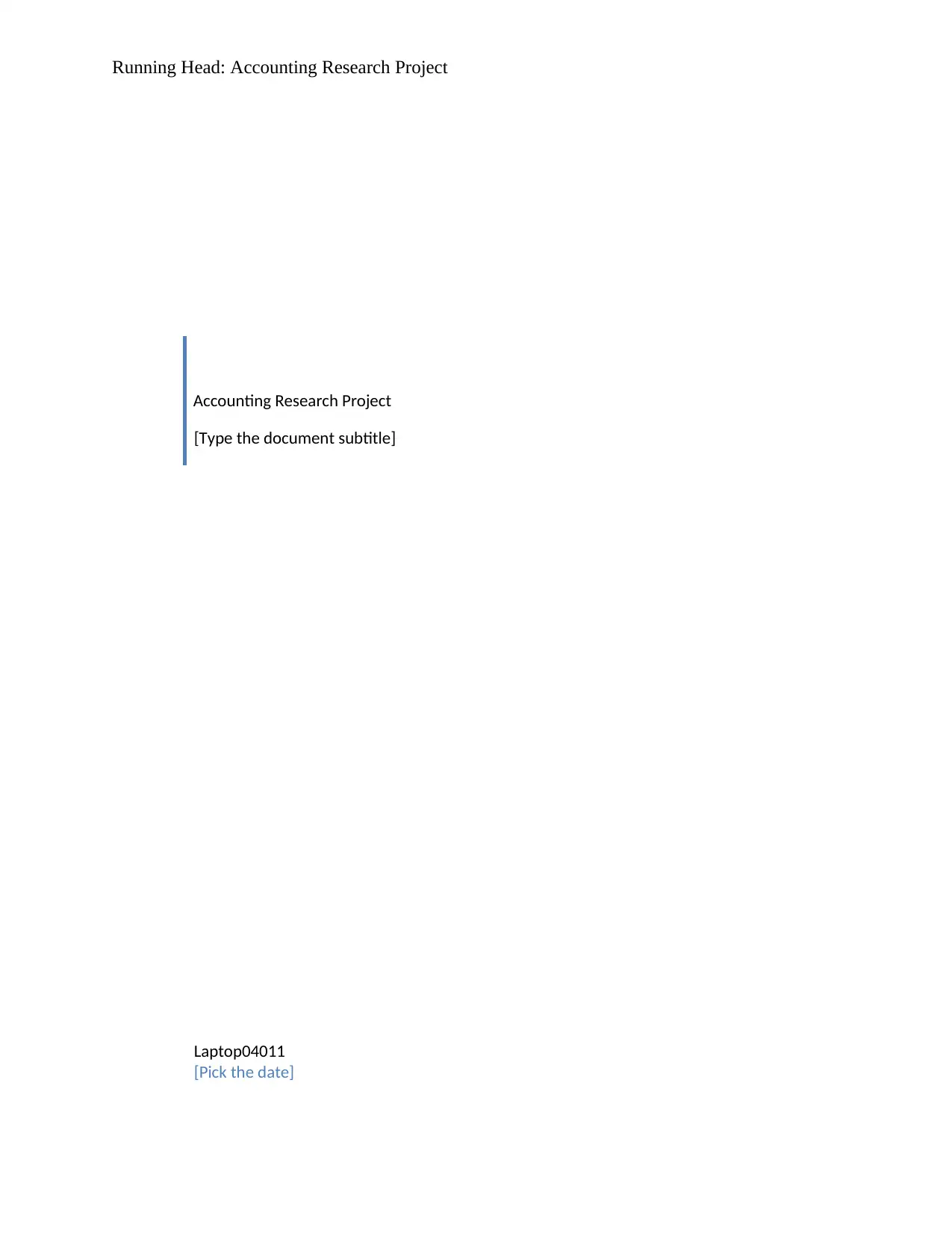
Running Head: Accounting Research Project
Accounting Research Project
[Type the document subtitle]
Laptop04011
[Pick the date]
Accounting Research Project
[Type the document subtitle]
Laptop04011
[Pick the date]
Paraphrase This Document
Need a fresh take? Get an instant paraphrase of this document with our AI Paraphraser
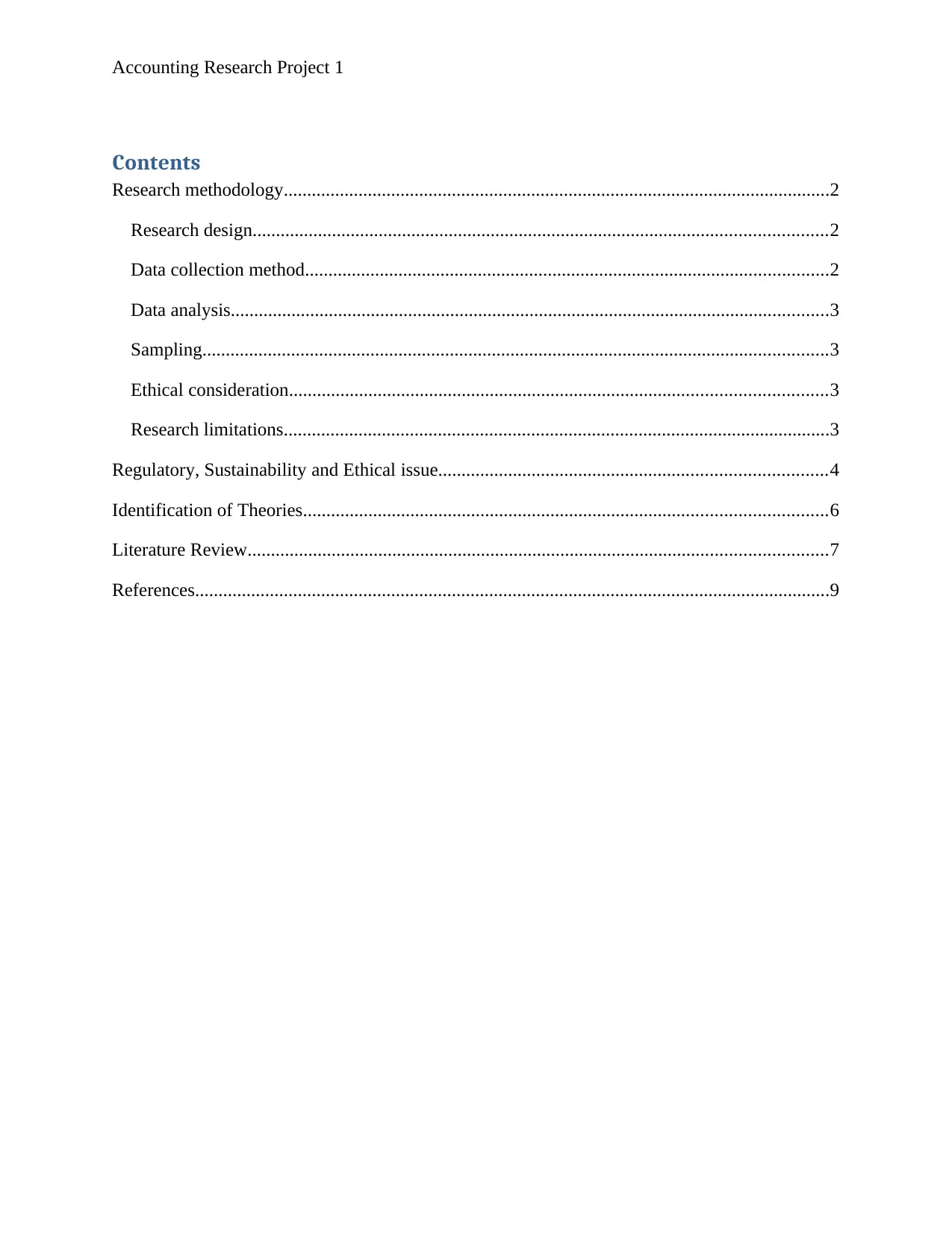
Accounting Research Project 1
Contents
Research methodology.....................................................................................................................2
Research design...........................................................................................................................2
Data collection method................................................................................................................2
Data analysis................................................................................................................................3
Sampling......................................................................................................................................3
Ethical consideration...................................................................................................................3
Research limitations.....................................................................................................................3
Regulatory, Sustainability and Ethical issue...................................................................................4
Identification of Theories................................................................................................................6
Literature Review............................................................................................................................7
References........................................................................................................................................9
Contents
Research methodology.....................................................................................................................2
Research design...........................................................................................................................2
Data collection method................................................................................................................2
Data analysis................................................................................................................................3
Sampling......................................................................................................................................3
Ethical consideration...................................................................................................................3
Research limitations.....................................................................................................................3
Regulatory, Sustainability and Ethical issue...................................................................................4
Identification of Theories................................................................................................................6
Literature Review............................................................................................................................7
References........................................................................................................................................9
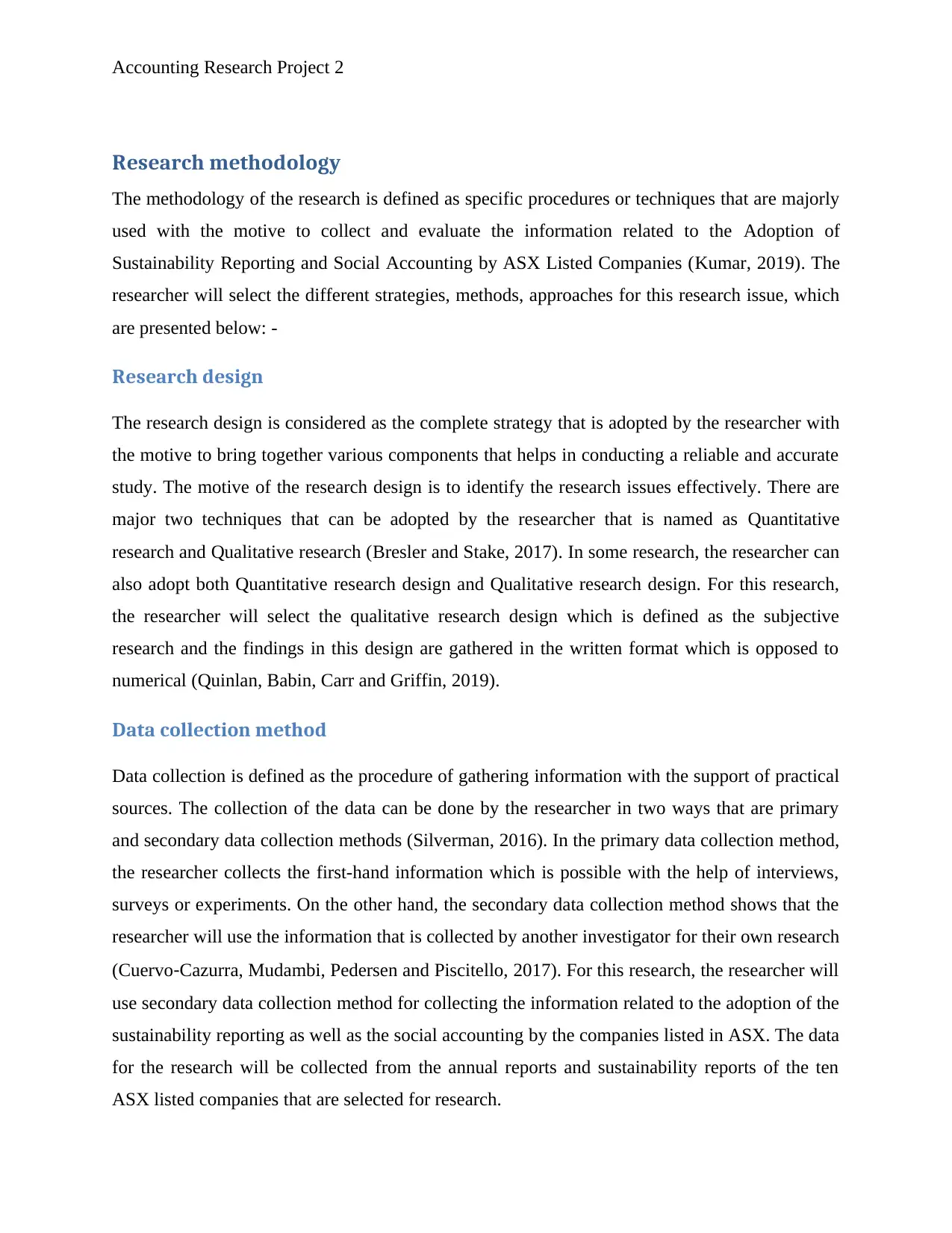
Accounting Research Project 2
Research methodology
The methodology of the research is defined as specific procedures or techniques that are majorly
used with the motive to collect and evaluate the information related to the Adoption of
Sustainability Reporting and Social Accounting by ASX Listed Companies (Kumar, 2019). The
researcher will select the different strategies, methods, approaches for this research issue, which
are presented below: -
Research design
The research design is considered as the complete strategy that is adopted by the researcher with
the motive to bring together various components that helps in conducting a reliable and accurate
study. The motive of the research design is to identify the research issues effectively. There are
major two techniques that can be adopted by the researcher that is named as Quantitative
research and Qualitative research (Bresler and Stake, 2017). In some research, the researcher can
also adopt both Quantitative research design and Qualitative research design. For this research,
the researcher will select the qualitative research design which is defined as the subjective
research and the findings in this design are gathered in the written format which is opposed to
numerical (Quinlan, Babin, Carr and Griffin, 2019).
Data collection method
Data collection is defined as the procedure of gathering information with the support of practical
sources. The collection of the data can be done by the researcher in two ways that are primary
and secondary data collection methods (Silverman, 2016). In the primary data collection method,
the researcher collects the first-hand information which is possible with the help of interviews,
surveys or experiments. On the other hand, the secondary data collection method shows that the
researcher will use the information that is collected by another investigator for their own research
(Cuervo‐Cazurra, Mudambi, Pedersen and Piscitello, 2017). For this research, the researcher will
use secondary data collection method for collecting the information related to the adoption of the
sustainability reporting as well as the social accounting by the companies listed in ASX. The data
for the research will be collected from the annual reports and sustainability reports of the ten
ASX listed companies that are selected for research.
Research methodology
The methodology of the research is defined as specific procedures or techniques that are majorly
used with the motive to collect and evaluate the information related to the Adoption of
Sustainability Reporting and Social Accounting by ASX Listed Companies (Kumar, 2019). The
researcher will select the different strategies, methods, approaches for this research issue, which
are presented below: -
Research design
The research design is considered as the complete strategy that is adopted by the researcher with
the motive to bring together various components that helps in conducting a reliable and accurate
study. The motive of the research design is to identify the research issues effectively. There are
major two techniques that can be adopted by the researcher that is named as Quantitative
research and Qualitative research (Bresler and Stake, 2017). In some research, the researcher can
also adopt both Quantitative research design and Qualitative research design. For this research,
the researcher will select the qualitative research design which is defined as the subjective
research and the findings in this design are gathered in the written format which is opposed to
numerical (Quinlan, Babin, Carr and Griffin, 2019).
Data collection method
Data collection is defined as the procedure of gathering information with the support of practical
sources. The collection of the data can be done by the researcher in two ways that are primary
and secondary data collection methods (Silverman, 2016). In the primary data collection method,
the researcher collects the first-hand information which is possible with the help of interviews,
surveys or experiments. On the other hand, the secondary data collection method shows that the
researcher will use the information that is collected by another investigator for their own research
(Cuervo‐Cazurra, Mudambi, Pedersen and Piscitello, 2017). For this research, the researcher will
use secondary data collection method for collecting the information related to the adoption of the
sustainability reporting as well as the social accounting by the companies listed in ASX. The data
for the research will be collected from the annual reports and sustainability reports of the ten
ASX listed companies that are selected for research.
⊘ This is a preview!⊘
Do you want full access?
Subscribe today to unlock all pages.

Trusted by 1+ million students worldwide
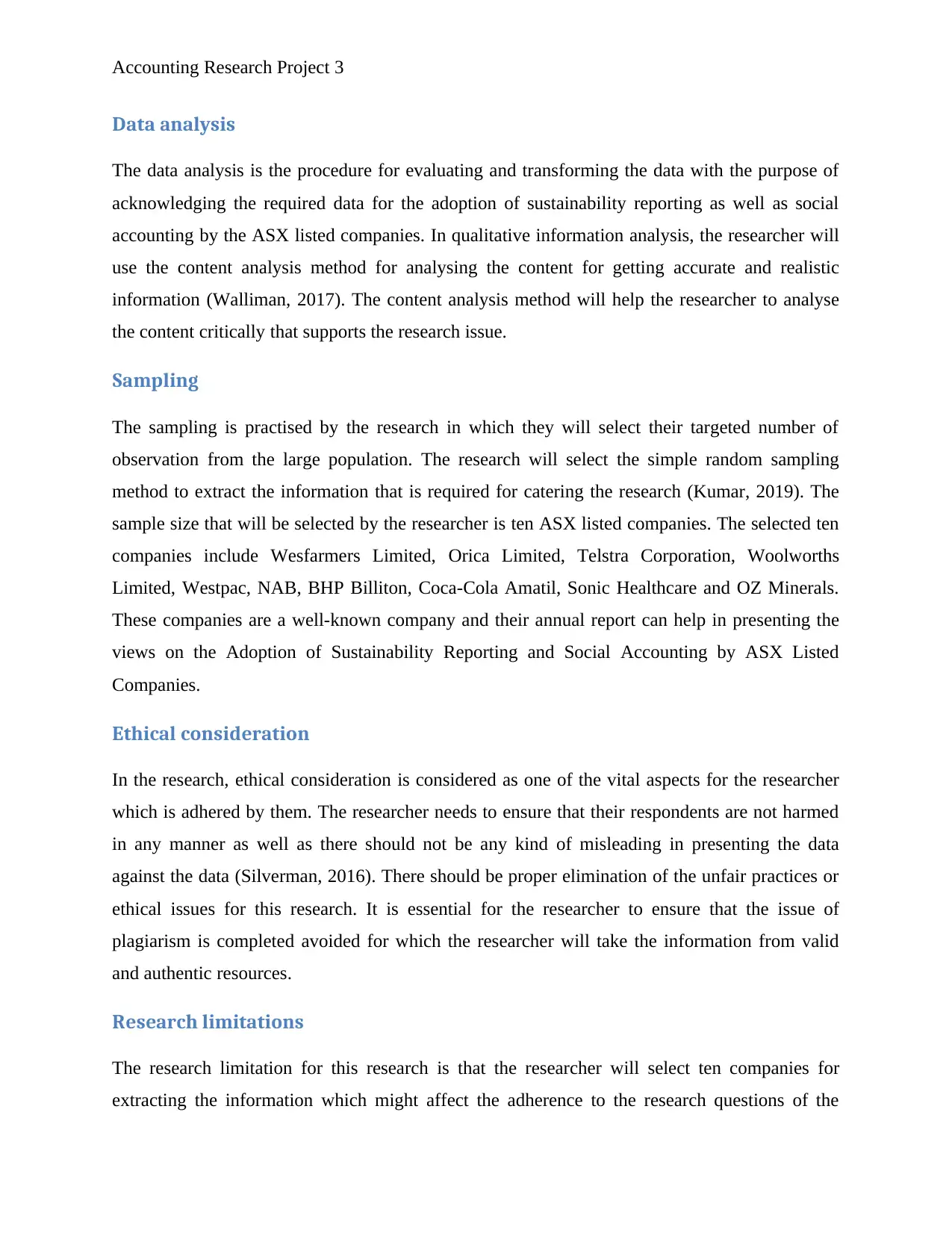
Accounting Research Project 3
Data analysis
The data analysis is the procedure for evaluating and transforming the data with the purpose of
acknowledging the required data for the adoption of sustainability reporting as well as social
accounting by the ASX listed companies. In qualitative information analysis, the researcher will
use the content analysis method for analysing the content for getting accurate and realistic
information (Walliman, 2017). The content analysis method will help the researcher to analyse
the content critically that supports the research issue.
Sampling
The sampling is practised by the research in which they will select their targeted number of
observation from the large population. The research will select the simple random sampling
method to extract the information that is required for catering the research (Kumar, 2019). The
sample size that will be selected by the researcher is ten ASX listed companies. The selected ten
companies include Wesfarmers Limited, Orica Limited, Telstra Corporation, Woolworths
Limited, Westpac, NAB, BHP Billiton, Coca-Cola Amatil, Sonic Healthcare and OZ Minerals.
These companies are a well-known company and their annual report can help in presenting the
views on the Adoption of Sustainability Reporting and Social Accounting by ASX Listed
Companies.
Ethical consideration
In the research, ethical consideration is considered as one of the vital aspects for the researcher
which is adhered by them. The researcher needs to ensure that their respondents are not harmed
in any manner as well as there should not be any kind of misleading in presenting the data
against the data (Silverman, 2016). There should be proper elimination of the unfair practices or
ethical issues for this research. It is essential for the researcher to ensure that the issue of
plagiarism is completed avoided for which the researcher will take the information from valid
and authentic resources.
Research limitations
The research limitation for this research is that the researcher will select ten companies for
extracting the information which might affect the adherence to the research questions of the
Data analysis
The data analysis is the procedure for evaluating and transforming the data with the purpose of
acknowledging the required data for the adoption of sustainability reporting as well as social
accounting by the ASX listed companies. In qualitative information analysis, the researcher will
use the content analysis method for analysing the content for getting accurate and realistic
information (Walliman, 2017). The content analysis method will help the researcher to analyse
the content critically that supports the research issue.
Sampling
The sampling is practised by the research in which they will select their targeted number of
observation from the large population. The research will select the simple random sampling
method to extract the information that is required for catering the research (Kumar, 2019). The
sample size that will be selected by the researcher is ten ASX listed companies. The selected ten
companies include Wesfarmers Limited, Orica Limited, Telstra Corporation, Woolworths
Limited, Westpac, NAB, BHP Billiton, Coca-Cola Amatil, Sonic Healthcare and OZ Minerals.
These companies are a well-known company and their annual report can help in presenting the
views on the Adoption of Sustainability Reporting and Social Accounting by ASX Listed
Companies.
Ethical consideration
In the research, ethical consideration is considered as one of the vital aspects for the researcher
which is adhered by them. The researcher needs to ensure that their respondents are not harmed
in any manner as well as there should not be any kind of misleading in presenting the data
against the data (Silverman, 2016). There should be proper elimination of the unfair practices or
ethical issues for this research. It is essential for the researcher to ensure that the issue of
plagiarism is completed avoided for which the researcher will take the information from valid
and authentic resources.
Research limitations
The research limitation for this research is that the researcher will select ten companies for
extracting the information which might affect the adherence to the research questions of the
Paraphrase This Document
Need a fresh take? Get an instant paraphrase of this document with our AI Paraphraser
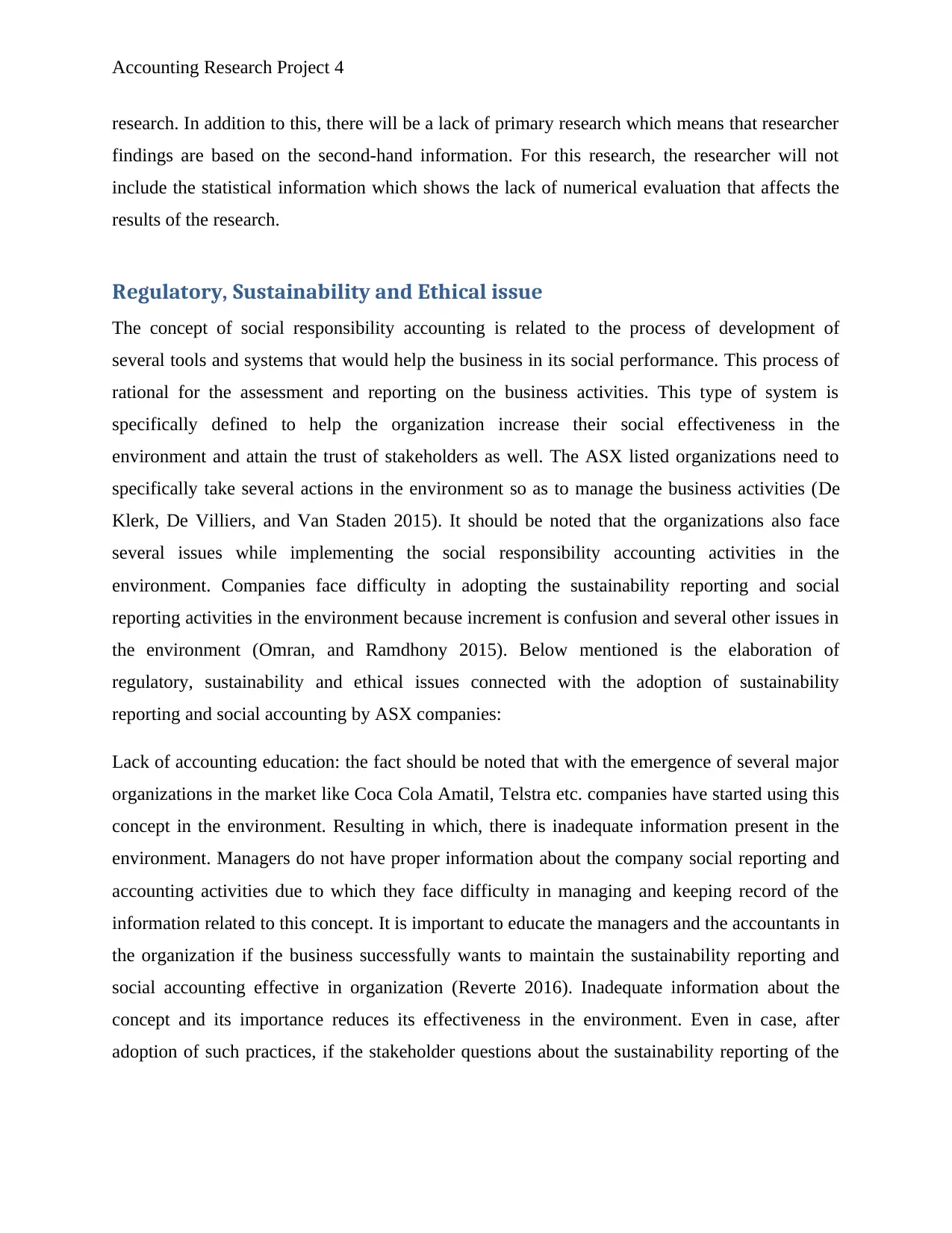
Accounting Research Project 4
research. In addition to this, there will be a lack of primary research which means that researcher
findings are based on the second-hand information. For this research, the researcher will not
include the statistical information which shows the lack of numerical evaluation that affects the
results of the research.
Regulatory, Sustainability and Ethical issue
The concept of social responsibility accounting is related to the process of development of
several tools and systems that would help the business in its social performance. This process of
rational for the assessment and reporting on the business activities. This type of system is
specifically defined to help the organization increase their social effectiveness in the
environment and attain the trust of stakeholders as well. The ASX listed organizations need to
specifically take several actions in the environment so as to manage the business activities (De
Klerk, De Villiers, and Van Staden 2015). It should be noted that the organizations also face
several issues while implementing the social responsibility accounting activities in the
environment. Companies face difficulty in adopting the sustainability reporting and social
reporting activities in the environment because increment is confusion and several other issues in
the environment (Omran, and Ramdhony 2015). Below mentioned is the elaboration of
regulatory, sustainability and ethical issues connected with the adoption of sustainability
reporting and social accounting by ASX companies:
Lack of accounting education: the fact should be noted that with the emergence of several major
organizations in the market like Coca Cola Amatil, Telstra etc. companies have started using this
concept in the environment. Resulting in which, there is inadequate information present in the
environment. Managers do not have proper information about the company social reporting and
accounting activities due to which they face difficulty in managing and keeping record of the
information related to this concept. It is important to educate the managers and the accountants in
the organization if the business successfully wants to maintain the sustainability reporting and
social accounting effective in organization (Reverte 2016). Inadequate information about the
concept and its importance reduces its effectiveness in the environment. Even in case, after
adoption of such practices, if the stakeholder questions about the sustainability reporting of the
research. In addition to this, there will be a lack of primary research which means that researcher
findings are based on the second-hand information. For this research, the researcher will not
include the statistical information which shows the lack of numerical evaluation that affects the
results of the research.
Regulatory, Sustainability and Ethical issue
The concept of social responsibility accounting is related to the process of development of
several tools and systems that would help the business in its social performance. This process of
rational for the assessment and reporting on the business activities. This type of system is
specifically defined to help the organization increase their social effectiveness in the
environment and attain the trust of stakeholders as well. The ASX listed organizations need to
specifically take several actions in the environment so as to manage the business activities (De
Klerk, De Villiers, and Van Staden 2015). It should be noted that the organizations also face
several issues while implementing the social responsibility accounting activities in the
environment. Companies face difficulty in adopting the sustainability reporting and social
reporting activities in the environment because increment is confusion and several other issues in
the environment (Omran, and Ramdhony 2015). Below mentioned is the elaboration of
regulatory, sustainability and ethical issues connected with the adoption of sustainability
reporting and social accounting by ASX companies:
Lack of accounting education: the fact should be noted that with the emergence of several major
organizations in the market like Coca Cola Amatil, Telstra etc. companies have started using this
concept in the environment. Resulting in which, there is inadequate information present in the
environment. Managers do not have proper information about the company social reporting and
accounting activities due to which they face difficulty in managing and keeping record of the
information related to this concept. It is important to educate the managers and the accountants in
the organization if the business successfully wants to maintain the sustainability reporting and
social accounting effective in organization (Reverte 2016). Inadequate information about the
concept and its importance reduces its effectiveness in the environment. Even in case, after
adoption of such practices, if the stakeholder questions about the sustainability reporting of the
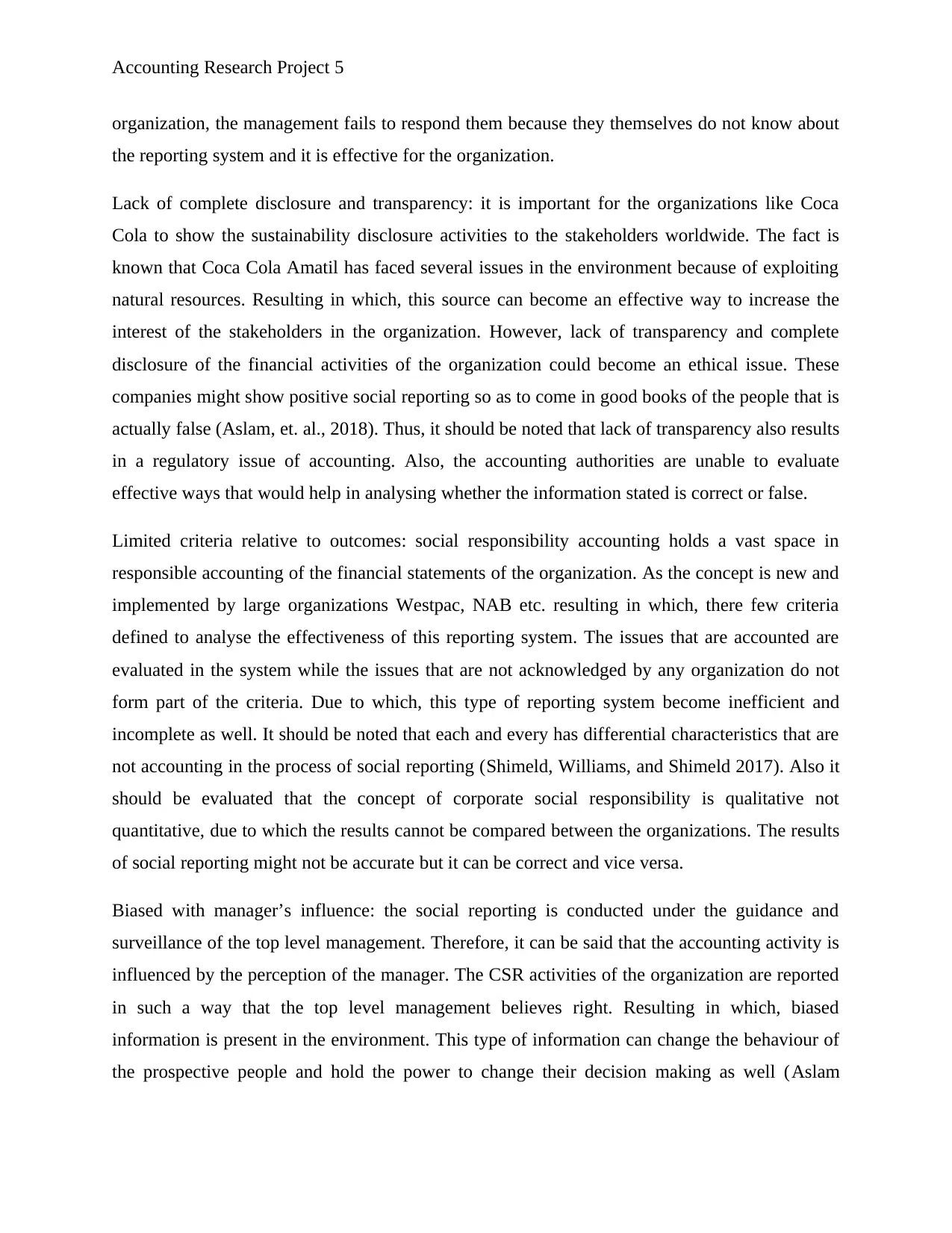
Accounting Research Project 5
organization, the management fails to respond them because they themselves do not know about
the reporting system and it is effective for the organization.
Lack of complete disclosure and transparency: it is important for the organizations like Coca
Cola to show the sustainability disclosure activities to the stakeholders worldwide. The fact is
known that Coca Cola Amatil has faced several issues in the environment because of exploiting
natural resources. Resulting in which, this source can become an effective way to increase the
interest of the stakeholders in the organization. However, lack of transparency and complete
disclosure of the financial activities of the organization could become an ethical issue. These
companies might show positive social reporting so as to come in good books of the people that is
actually false (Aslam, et. al., 2018). Thus, it should be noted that lack of transparency also results
in a regulatory issue of accounting. Also, the accounting authorities are unable to evaluate
effective ways that would help in analysing whether the information stated is correct or false.
Limited criteria relative to outcomes: social responsibility accounting holds a vast space in
responsible accounting of the financial statements of the organization. As the concept is new and
implemented by large organizations Westpac, NAB etc. resulting in which, there few criteria
defined to analyse the effectiveness of this reporting system. The issues that are accounted are
evaluated in the system while the issues that are not acknowledged by any organization do not
form part of the criteria. Due to which, this type of reporting system become inefficient and
incomplete as well. It should be noted that each and every has differential characteristics that are
not accounting in the process of social reporting (Shimeld, Williams, and Shimeld 2017). Also it
should be evaluated that the concept of corporate social responsibility is qualitative not
quantitative, due to which the results cannot be compared between the organizations. The results
of social reporting might not be accurate but it can be correct and vice versa.
Biased with manager’s influence: the social reporting is conducted under the guidance and
surveillance of the top level management. Therefore, it can be said that the accounting activity is
influenced by the perception of the manager. The CSR activities of the organization are reported
in such a way that the top level management believes right. Resulting in which, biased
information is present in the environment. This type of information can change the behaviour of
the prospective people and hold the power to change their decision making as well (Aslam
organization, the management fails to respond them because they themselves do not know about
the reporting system and it is effective for the organization.
Lack of complete disclosure and transparency: it is important for the organizations like Coca
Cola to show the sustainability disclosure activities to the stakeholders worldwide. The fact is
known that Coca Cola Amatil has faced several issues in the environment because of exploiting
natural resources. Resulting in which, this source can become an effective way to increase the
interest of the stakeholders in the organization. However, lack of transparency and complete
disclosure of the financial activities of the organization could become an ethical issue. These
companies might show positive social reporting so as to come in good books of the people that is
actually false (Aslam, et. al., 2018). Thus, it should be noted that lack of transparency also results
in a regulatory issue of accounting. Also, the accounting authorities are unable to evaluate
effective ways that would help in analysing whether the information stated is correct or false.
Limited criteria relative to outcomes: social responsibility accounting holds a vast space in
responsible accounting of the financial statements of the organization. As the concept is new and
implemented by large organizations Westpac, NAB etc. resulting in which, there few criteria
defined to analyse the effectiveness of this reporting system. The issues that are accounted are
evaluated in the system while the issues that are not acknowledged by any organization do not
form part of the criteria. Due to which, this type of reporting system become inefficient and
incomplete as well. It should be noted that each and every has differential characteristics that are
not accounting in the process of social reporting (Shimeld, Williams, and Shimeld 2017). Also it
should be evaluated that the concept of corporate social responsibility is qualitative not
quantitative, due to which the results cannot be compared between the organizations. The results
of social reporting might not be accurate but it can be correct and vice versa.
Biased with manager’s influence: the social reporting is conducted under the guidance and
surveillance of the top level management. Therefore, it can be said that the accounting activity is
influenced by the perception of the manager. The CSR activities of the organization are reported
in such a way that the top level management believes right. Resulting in which, biased
information is present in the environment. This type of information can change the behaviour of
the prospective people and hold the power to change their decision making as well (Aslam
⊘ This is a preview!⊘
Do you want full access?
Subscribe today to unlock all pages.

Trusted by 1+ million students worldwide
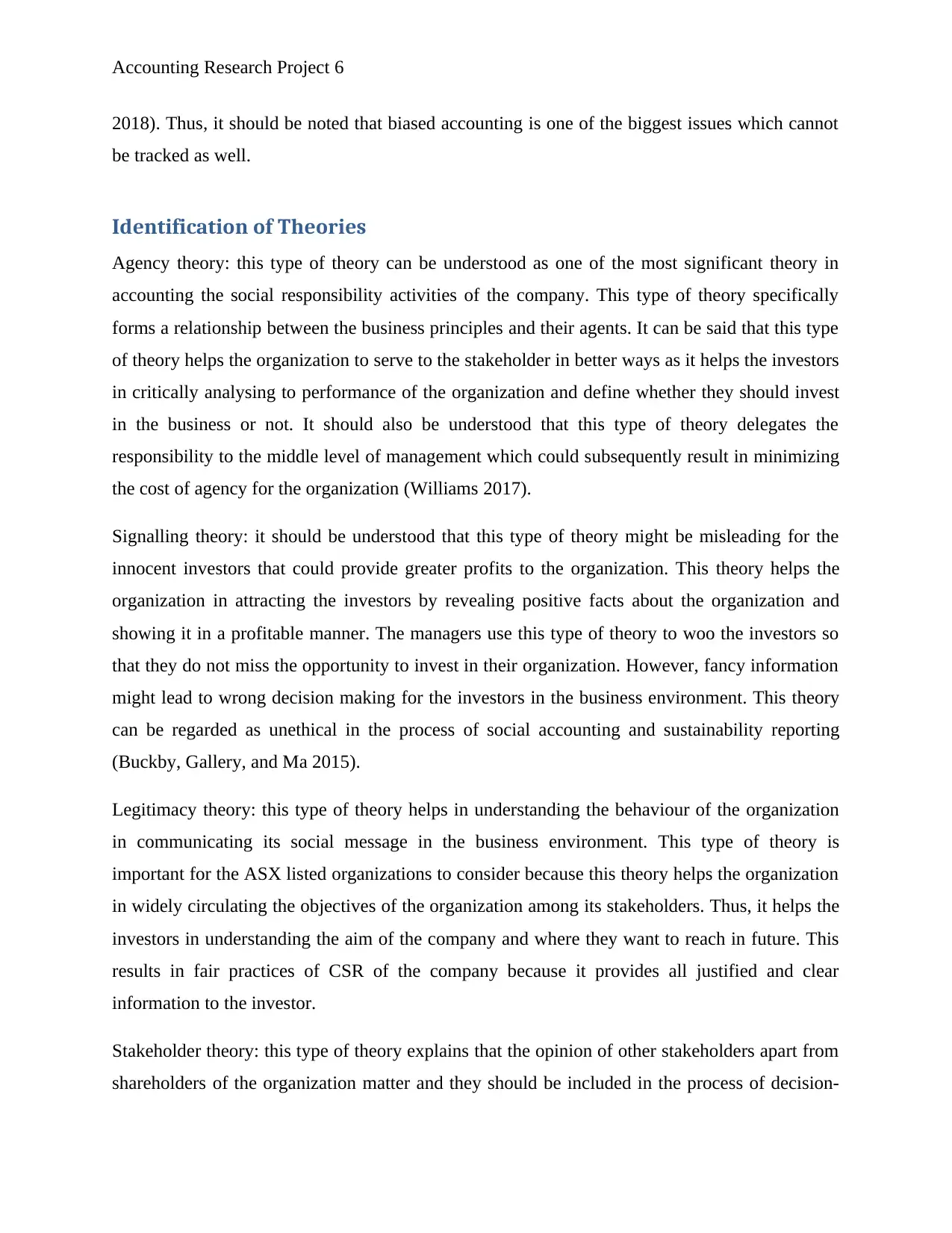
Accounting Research Project 6
2018). Thus, it should be noted that biased accounting is one of the biggest issues which cannot
be tracked as well.
Identification of Theories
Agency theory: this type of theory can be understood as one of the most significant theory in
accounting the social responsibility activities of the company. This type of theory specifically
forms a relationship between the business principles and their agents. It can be said that this type
of theory helps the organization to serve to the stakeholder in better ways as it helps the investors
in critically analysing to performance of the organization and define whether they should invest
in the business or not. It should also be understood that this type of theory delegates the
responsibility to the middle level of management which could subsequently result in minimizing
the cost of agency for the organization (Williams 2017).
Signalling theory: it should be understood that this type of theory might be misleading for the
innocent investors that could provide greater profits to the organization. This theory helps the
organization in attracting the investors by revealing positive facts about the organization and
showing it in a profitable manner. The managers use this type of theory to woo the investors so
that they do not miss the opportunity to invest in their organization. However, fancy information
might lead to wrong decision making for the investors in the business environment. This theory
can be regarded as unethical in the process of social accounting and sustainability reporting
(Buckby, Gallery, and Ma 2015).
Legitimacy theory: this type of theory helps in understanding the behaviour of the organization
in communicating its social message in the business environment. This type of theory is
important for the ASX listed organizations to consider because this theory helps the organization
in widely circulating the objectives of the organization among its stakeholders. Thus, it helps the
investors in understanding the aim of the company and where they want to reach in future. This
results in fair practices of CSR of the company because it provides all justified and clear
information to the investor.
Stakeholder theory: this type of theory explains that the opinion of other stakeholders apart from
shareholders of the organization matter and they should be included in the process of decision-
2018). Thus, it should be noted that biased accounting is one of the biggest issues which cannot
be tracked as well.
Identification of Theories
Agency theory: this type of theory can be understood as one of the most significant theory in
accounting the social responsibility activities of the company. This type of theory specifically
forms a relationship between the business principles and their agents. It can be said that this type
of theory helps the organization to serve to the stakeholder in better ways as it helps the investors
in critically analysing to performance of the organization and define whether they should invest
in the business or not. It should also be understood that this type of theory delegates the
responsibility to the middle level of management which could subsequently result in minimizing
the cost of agency for the organization (Williams 2017).
Signalling theory: it should be understood that this type of theory might be misleading for the
innocent investors that could provide greater profits to the organization. This theory helps the
organization in attracting the investors by revealing positive facts about the organization and
showing it in a profitable manner. The managers use this type of theory to woo the investors so
that they do not miss the opportunity to invest in their organization. However, fancy information
might lead to wrong decision making for the investors in the business environment. This theory
can be regarded as unethical in the process of social accounting and sustainability reporting
(Buckby, Gallery, and Ma 2015).
Legitimacy theory: this type of theory helps in understanding the behaviour of the organization
in communicating its social message in the business environment. This type of theory is
important for the ASX listed organizations to consider because this theory helps the organization
in widely circulating the objectives of the organization among its stakeholders. Thus, it helps the
investors in understanding the aim of the company and where they want to reach in future. This
results in fair practices of CSR of the company because it provides all justified and clear
information to the investor.
Stakeholder theory: this type of theory explains that the opinion of other stakeholders apart from
shareholders of the organization matter and they should be included in the process of decision-
Paraphrase This Document
Need a fresh take? Get an instant paraphrase of this document with our AI Paraphraser
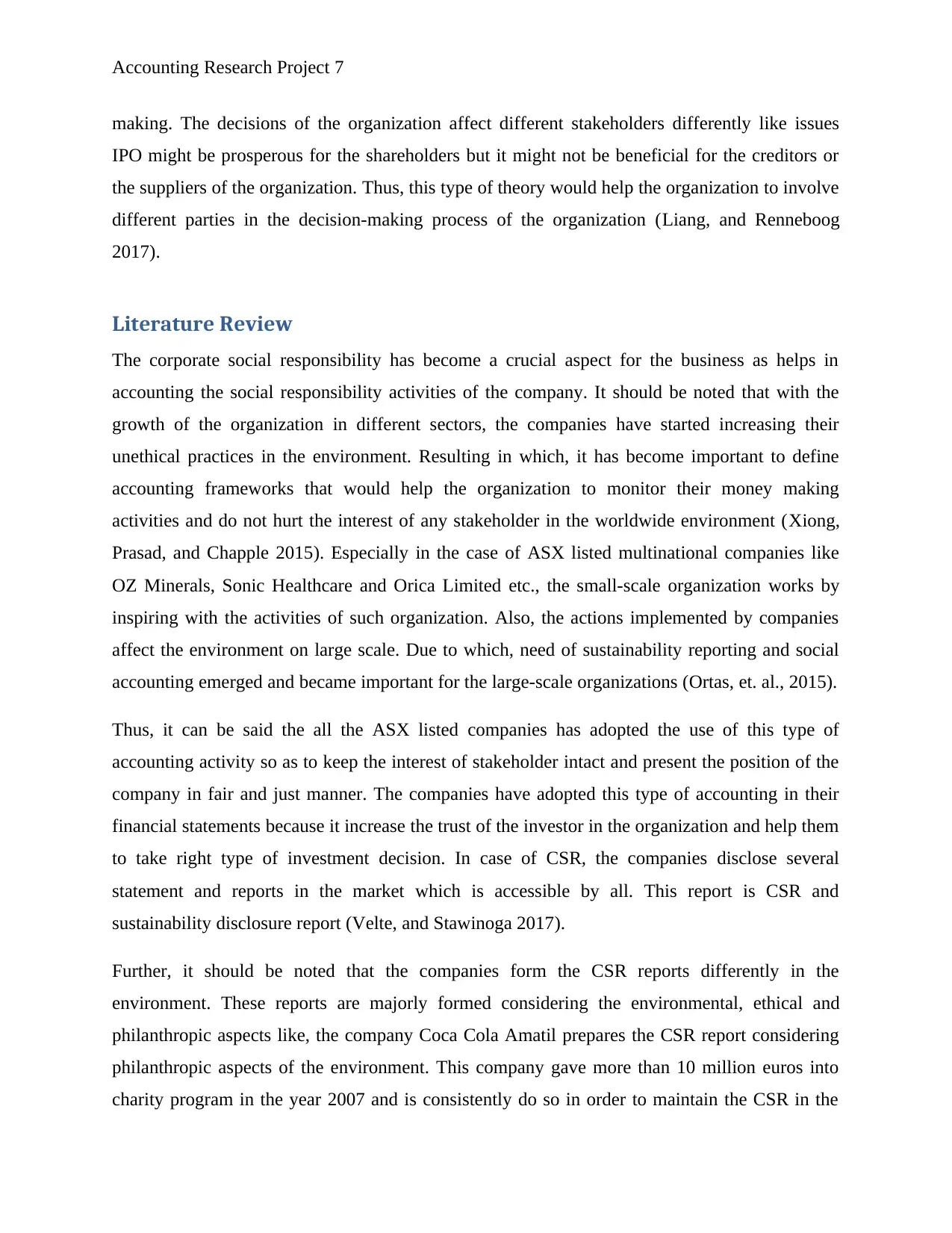
Accounting Research Project 7
making. The decisions of the organization affect different stakeholders differently like issues
IPO might be prosperous for the shareholders but it might not be beneficial for the creditors or
the suppliers of the organization. Thus, this type of theory would help the organization to involve
different parties in the decision-making process of the organization (Liang, and Renneboog
2017).
Literature Review
The corporate social responsibility has become a crucial aspect for the business as helps in
accounting the social responsibility activities of the company. It should be noted that with the
growth of the organization in different sectors, the companies have started increasing their
unethical practices in the environment. Resulting in which, it has become important to define
accounting frameworks that would help the organization to monitor their money making
activities and do not hurt the interest of any stakeholder in the worldwide environment (Xiong,
Prasad, and Chapple 2015). Especially in the case of ASX listed multinational companies like
OZ Minerals, Sonic Healthcare and Orica Limited etc., the small-scale organization works by
inspiring with the activities of such organization. Also, the actions implemented by companies
affect the environment on large scale. Due to which, need of sustainability reporting and social
accounting emerged and became important for the large-scale organizations (Ortas, et. al., 2015).
Thus, it can be said the all the ASX listed companies has adopted the use of this type of
accounting activity so as to keep the interest of stakeholder intact and present the position of the
company in fair and just manner. The companies have adopted this type of accounting in their
financial statements because it increase the trust of the investor in the organization and help them
to take right type of investment decision. In case of CSR, the companies disclose several
statement and reports in the market which is accessible by all. This report is CSR and
sustainability disclosure report (Velte, and Stawinoga 2017).
Further, it should be noted that the companies form the CSR reports differently in the
environment. These reports are majorly formed considering the environmental, ethical and
philanthropic aspects like, the company Coca Cola Amatil prepares the CSR report considering
philanthropic aspects of the environment. This company gave more than 10 million euros into
charity program in the year 2007 and is consistently do so in order to maintain the CSR in the
making. The decisions of the organization affect different stakeholders differently like issues
IPO might be prosperous for the shareholders but it might not be beneficial for the creditors or
the suppliers of the organization. Thus, this type of theory would help the organization to involve
different parties in the decision-making process of the organization (Liang, and Renneboog
2017).
Literature Review
The corporate social responsibility has become a crucial aspect for the business as helps in
accounting the social responsibility activities of the company. It should be noted that with the
growth of the organization in different sectors, the companies have started increasing their
unethical practices in the environment. Resulting in which, it has become important to define
accounting frameworks that would help the organization to monitor their money making
activities and do not hurt the interest of any stakeholder in the worldwide environment (Xiong,
Prasad, and Chapple 2015). Especially in the case of ASX listed multinational companies like
OZ Minerals, Sonic Healthcare and Orica Limited etc., the small-scale organization works by
inspiring with the activities of such organization. Also, the actions implemented by companies
affect the environment on large scale. Due to which, need of sustainability reporting and social
accounting emerged and became important for the large-scale organizations (Ortas, et. al., 2015).
Thus, it can be said the all the ASX listed companies has adopted the use of this type of
accounting activity so as to keep the interest of stakeholder intact and present the position of the
company in fair and just manner. The companies have adopted this type of accounting in their
financial statements because it increase the trust of the investor in the organization and help them
to take right type of investment decision. In case of CSR, the companies disclose several
statement and reports in the market which is accessible by all. This report is CSR and
sustainability disclosure report (Velte, and Stawinoga 2017).
Further, it should be noted that the companies form the CSR reports differently in the
environment. These reports are majorly formed considering the environmental, ethical and
philanthropic aspects like, the company Coca Cola Amatil prepares the CSR report considering
philanthropic aspects of the environment. This company gave more than 10 million euros into
charity program in the year 2007 and is consistently do so in order to maintain the CSR in the
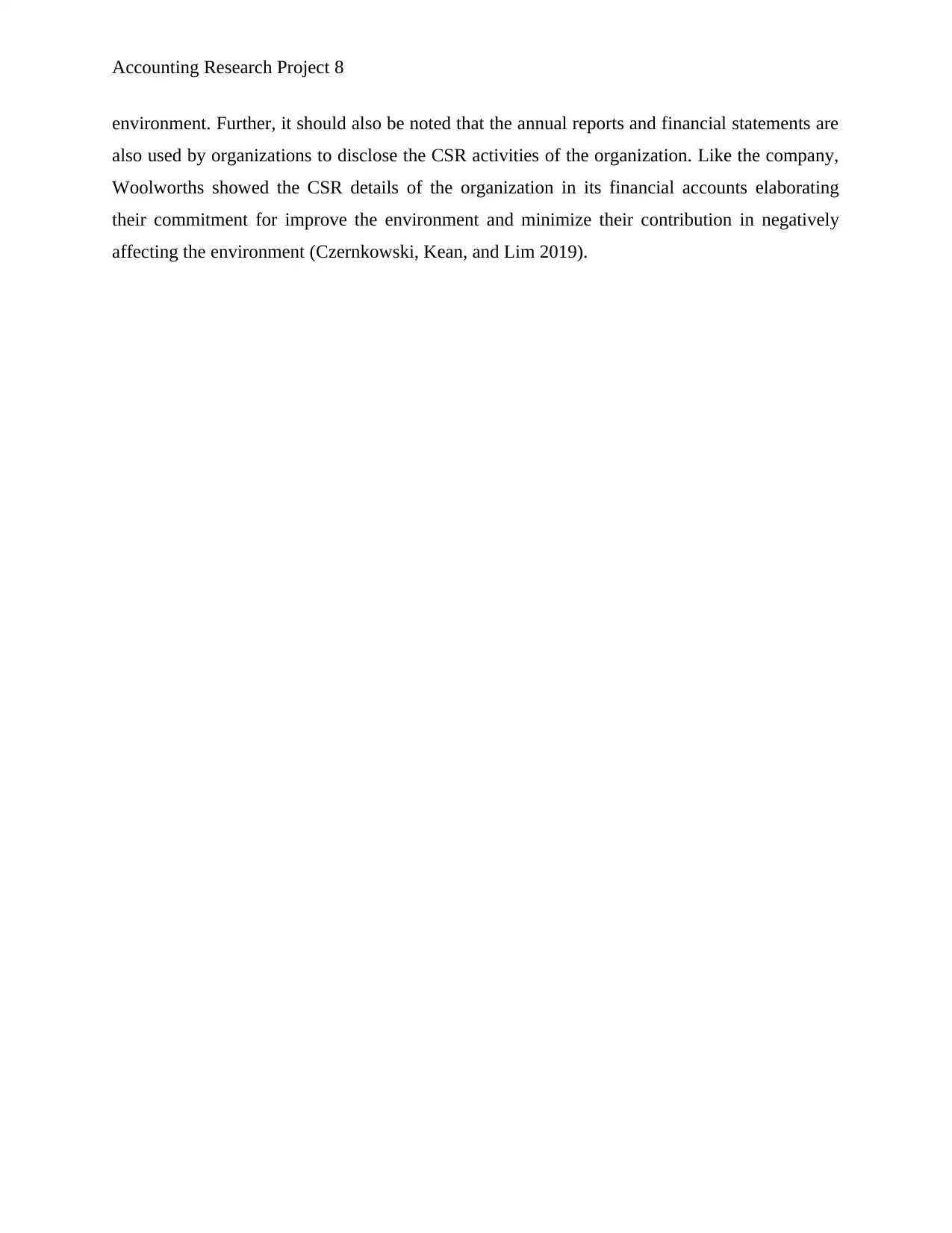
Accounting Research Project 8
environment. Further, it should also be noted that the annual reports and financial statements are
also used by organizations to disclose the CSR activities of the organization. Like the company,
Woolworths showed the CSR details of the organization in its financial accounts elaborating
their commitment for improve the environment and minimize their contribution in negatively
affecting the environment (Czernkowski, Kean, and Lim 2019).
environment. Further, it should also be noted that the annual reports and financial statements are
also used by organizations to disclose the CSR activities of the organization. Like the company,
Woolworths showed the CSR details of the organization in its financial accounts elaborating
their commitment for improve the environment and minimize their contribution in negatively
affecting the environment (Czernkowski, Kean, and Lim 2019).
⊘ This is a preview!⊘
Do you want full access?
Subscribe today to unlock all pages.

Trusted by 1+ million students worldwide
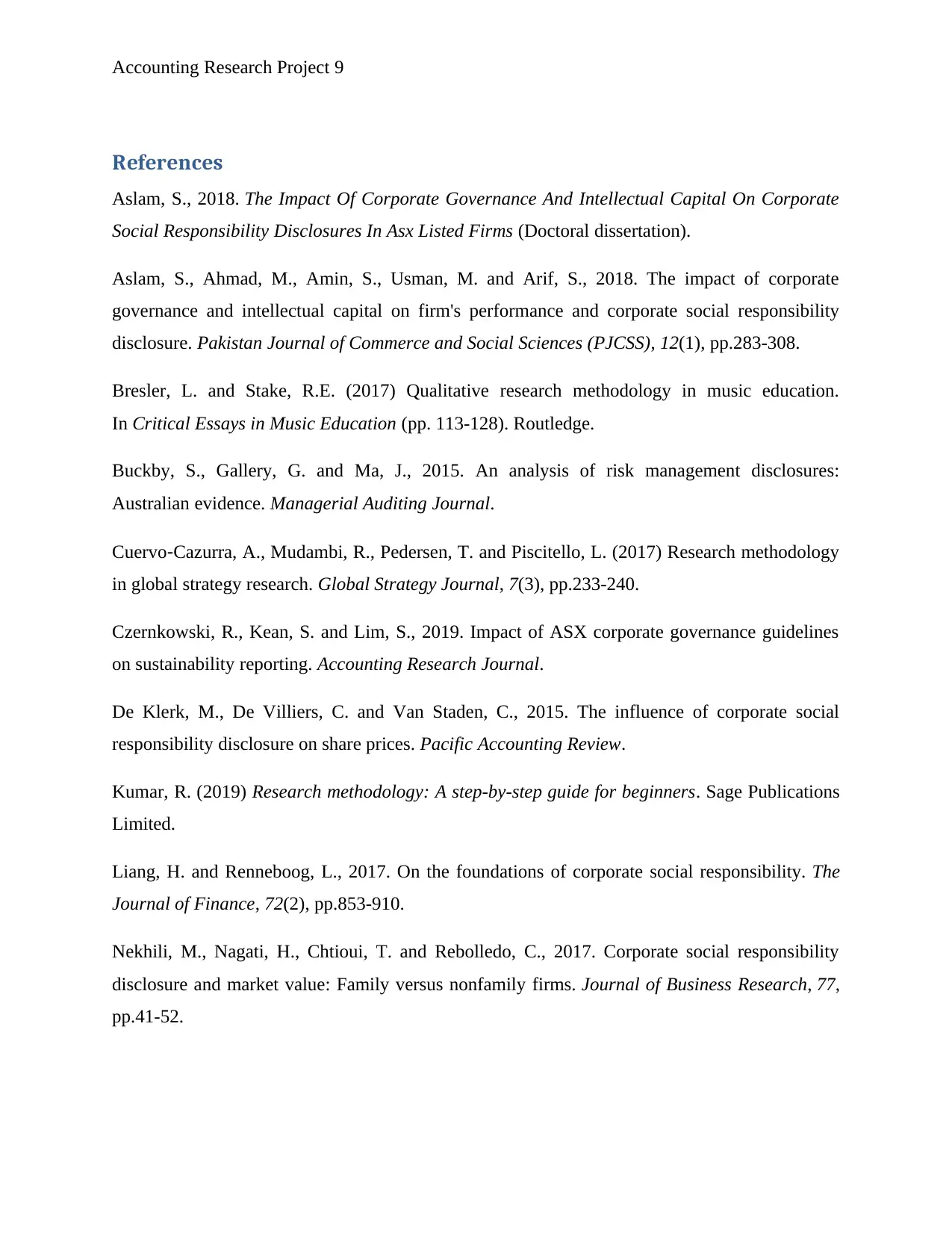
Accounting Research Project 9
References
Aslam, S., 2018. The Impact Of Corporate Governance And Intellectual Capital On Corporate
Social Responsibility Disclosures In Asx Listed Firms (Doctoral dissertation).
Aslam, S., Ahmad, M., Amin, S., Usman, M. and Arif, S., 2018. The impact of corporate
governance and intellectual capital on firm's performance and corporate social responsibility
disclosure. Pakistan Journal of Commerce and Social Sciences (PJCSS), 12(1), pp.283-308.
Bresler, L. and Stake, R.E. (2017) Qualitative research methodology in music education.
In Critical Essays in Music Education (pp. 113-128). Routledge.
Buckby, S., Gallery, G. and Ma, J., 2015. An analysis of risk management disclosures:
Australian evidence. Managerial Auditing Journal.
Cuervo‐Cazurra, A., Mudambi, R., Pedersen, T. and Piscitello, L. (2017) Research methodology
in global strategy research. Global Strategy Journal, 7(3), pp.233-240.
Czernkowski, R., Kean, S. and Lim, S., 2019. Impact of ASX corporate governance guidelines
on sustainability reporting. Accounting Research Journal.
De Klerk, M., De Villiers, C. and Van Staden, C., 2015. The influence of corporate social
responsibility disclosure on share prices. Pacific Accounting Review.
Kumar, R. (2019) Research methodology: A step-by-step guide for beginners. Sage Publications
Limited.
Liang, H. and Renneboog, L., 2017. On the foundations of corporate social responsibility. The
Journal of Finance, 72(2), pp.853-910.
Nekhili, M., Nagati, H., Chtioui, T. and Rebolledo, C., 2017. Corporate social responsibility
disclosure and market value: Family versus nonfamily firms. Journal of Business Research, 77,
pp.41-52.
References
Aslam, S., 2018. The Impact Of Corporate Governance And Intellectual Capital On Corporate
Social Responsibility Disclosures In Asx Listed Firms (Doctoral dissertation).
Aslam, S., Ahmad, M., Amin, S., Usman, M. and Arif, S., 2018. The impact of corporate
governance and intellectual capital on firm's performance and corporate social responsibility
disclosure. Pakistan Journal of Commerce and Social Sciences (PJCSS), 12(1), pp.283-308.
Bresler, L. and Stake, R.E. (2017) Qualitative research methodology in music education.
In Critical Essays in Music Education (pp. 113-128). Routledge.
Buckby, S., Gallery, G. and Ma, J., 2015. An analysis of risk management disclosures:
Australian evidence. Managerial Auditing Journal.
Cuervo‐Cazurra, A., Mudambi, R., Pedersen, T. and Piscitello, L. (2017) Research methodology
in global strategy research. Global Strategy Journal, 7(3), pp.233-240.
Czernkowski, R., Kean, S. and Lim, S., 2019. Impact of ASX corporate governance guidelines
on sustainability reporting. Accounting Research Journal.
De Klerk, M., De Villiers, C. and Van Staden, C., 2015. The influence of corporate social
responsibility disclosure on share prices. Pacific Accounting Review.
Kumar, R. (2019) Research methodology: A step-by-step guide for beginners. Sage Publications
Limited.
Liang, H. and Renneboog, L., 2017. On the foundations of corporate social responsibility. The
Journal of Finance, 72(2), pp.853-910.
Nekhili, M., Nagati, H., Chtioui, T. and Rebolledo, C., 2017. Corporate social responsibility
disclosure and market value: Family versus nonfamily firms. Journal of Business Research, 77,
pp.41-52.
Paraphrase This Document
Need a fresh take? Get an instant paraphrase of this document with our AI Paraphraser
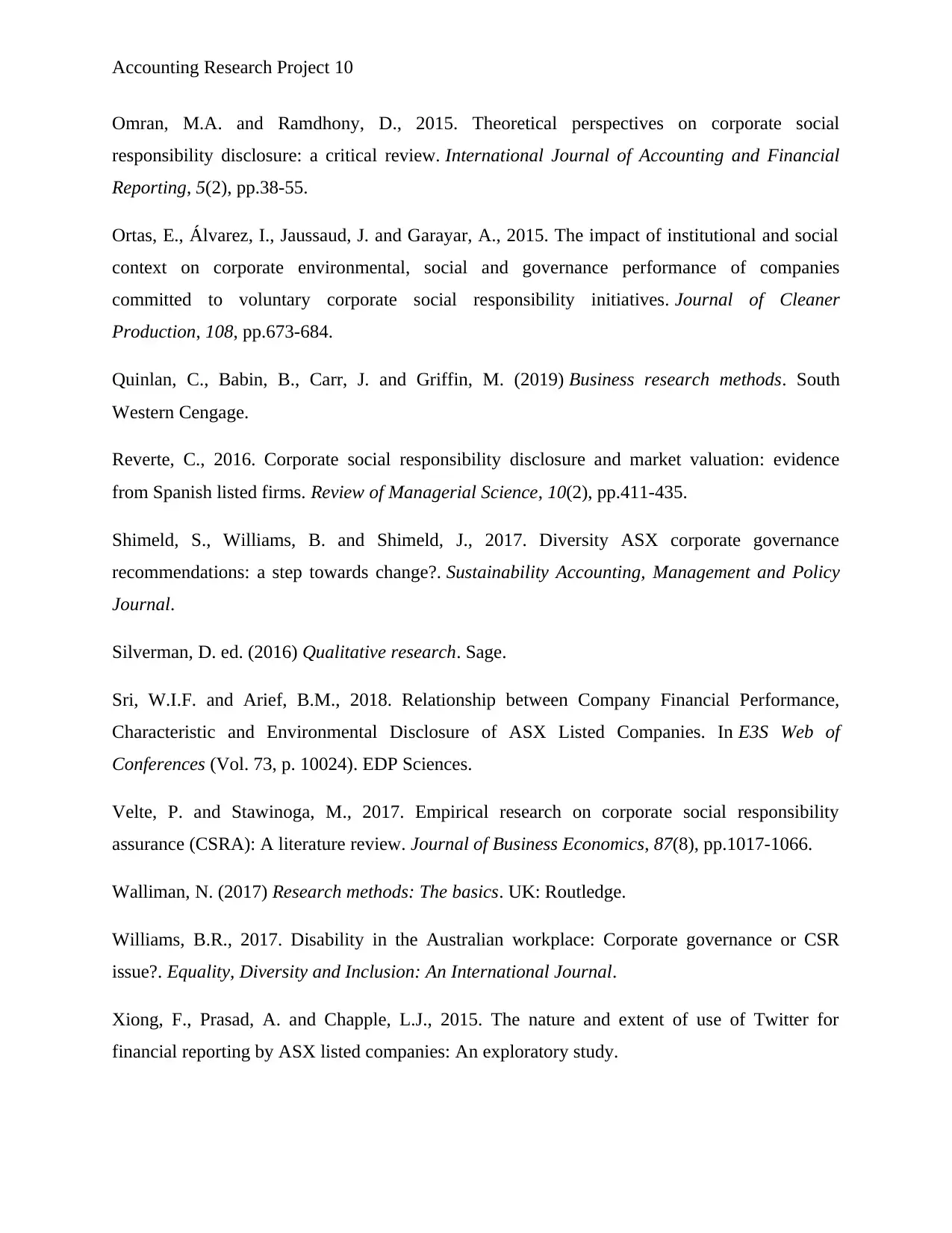
Accounting Research Project 10
Omran, M.A. and Ramdhony, D., 2015. Theoretical perspectives on corporate social
responsibility disclosure: a critical review. International Journal of Accounting and Financial
Reporting, 5(2), pp.38-55.
Ortas, E., Álvarez, I., Jaussaud, J. and Garayar, A., 2015. The impact of institutional and social
context on corporate environmental, social and governance performance of companies
committed to voluntary corporate social responsibility initiatives. Journal of Cleaner
Production, 108, pp.673-684.
Quinlan, C., Babin, B., Carr, J. and Griffin, M. (2019) Business research methods. South
Western Cengage.
Reverte, C., 2016. Corporate social responsibility disclosure and market valuation: evidence
from Spanish listed firms. Review of Managerial Science, 10(2), pp.411-435.
Shimeld, S., Williams, B. and Shimeld, J., 2017. Diversity ASX corporate governance
recommendations: a step towards change?. Sustainability Accounting, Management and Policy
Journal.
Silverman, D. ed. (2016) Qualitative research. Sage.
Sri, W.I.F. and Arief, B.M., 2018. Relationship between Company Financial Performance,
Characteristic and Environmental Disclosure of ASX Listed Companies. In E3S Web of
Conferences (Vol. 73, p. 10024). EDP Sciences.
Velte, P. and Stawinoga, M., 2017. Empirical research on corporate social responsibility
assurance (CSRA): A literature review. Journal of Business Economics, 87(8), pp.1017-1066.
Walliman, N. (2017) Research methods: The basics. UK: Routledge.
Williams, B.R., 2017. Disability in the Australian workplace: Corporate governance or CSR
issue?. Equality, Diversity and Inclusion: An International Journal.
Xiong, F., Prasad, A. and Chapple, L.J., 2015. The nature and extent of use of Twitter for
financial reporting by ASX listed companies: An exploratory study.
Omran, M.A. and Ramdhony, D., 2015. Theoretical perspectives on corporate social
responsibility disclosure: a critical review. International Journal of Accounting and Financial
Reporting, 5(2), pp.38-55.
Ortas, E., Álvarez, I., Jaussaud, J. and Garayar, A., 2015. The impact of institutional and social
context on corporate environmental, social and governance performance of companies
committed to voluntary corporate social responsibility initiatives. Journal of Cleaner
Production, 108, pp.673-684.
Quinlan, C., Babin, B., Carr, J. and Griffin, M. (2019) Business research methods. South
Western Cengage.
Reverte, C., 2016. Corporate social responsibility disclosure and market valuation: evidence
from Spanish listed firms. Review of Managerial Science, 10(2), pp.411-435.
Shimeld, S., Williams, B. and Shimeld, J., 2017. Diversity ASX corporate governance
recommendations: a step towards change?. Sustainability Accounting, Management and Policy
Journal.
Silverman, D. ed. (2016) Qualitative research. Sage.
Sri, W.I.F. and Arief, B.M., 2018. Relationship between Company Financial Performance,
Characteristic and Environmental Disclosure of ASX Listed Companies. In E3S Web of
Conferences (Vol. 73, p. 10024). EDP Sciences.
Velte, P. and Stawinoga, M., 2017. Empirical research on corporate social responsibility
assurance (CSRA): A literature review. Journal of Business Economics, 87(8), pp.1017-1066.
Walliman, N. (2017) Research methods: The basics. UK: Routledge.
Williams, B.R., 2017. Disability in the Australian workplace: Corporate governance or CSR
issue?. Equality, Diversity and Inclusion: An International Journal.
Xiong, F., Prasad, A. and Chapple, L.J., 2015. The nature and extent of use of Twitter for
financial reporting by ASX listed companies: An exploratory study.
1 out of 11
Related Documents
Your All-in-One AI-Powered Toolkit for Academic Success.
+13062052269
info@desklib.com
Available 24*7 on WhatsApp / Email
![[object Object]](/_next/static/media/star-bottom.7253800d.svg)
Unlock your academic potential
Copyright © 2020–2026 A2Z Services. All Rights Reserved. Developed and managed by ZUCOL.





